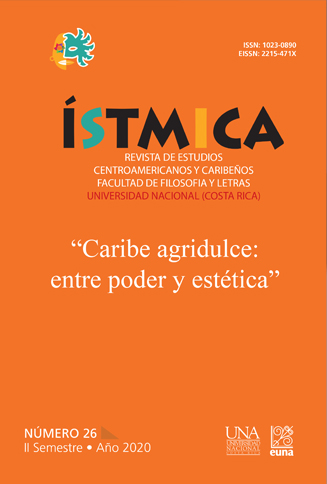Double-edged weapons: humor in The Fat Black Woman’s Poems and Lazy Thoughts of a Lazy Woman, by Grace Nichols
DOI:
https://doi.org/10.15359/istmica.26.3Keywords:
Humor, Caribbean poetry, overflow, breaks, Grace NicholsAbstract
The second and third poetry collection (The Fat Black Woman’s Poems [1984] y Lazy Thoughts of a Lazy Woman [1989], respectively) by Grace Nichols, Guyanese author living in the United Kingdom since 1977, are related due to the use of humor. Criticized for utilizing this resource, seen as excess of lightness when addressing complex themes such as slavery, the harsh life of the Caribbean immigrant, or female sexuality, Nichols reclaims humor as a way of ascribing herself to Antillean tradition. In the current essay, we will explore through the analysis of four poems (two from each book) how humor operates in both collections and which simplifications it entails, emphasizing how the apparent lightness it gives is, seen as part of Caribbean tradition, another way of resistance.
References
- Agard, John. 1985. Mangoes & bullets: selected and new poems, 1972-84. Londres: Pluto Press.
- Bajtin, Mijael. 1976. «Carnaval y Literatura.» Revista Eco, n.o 134: 311–338.
- Bringas López, Ana. 2003. «Representations of black omen in Grace Nichol’s poetry: from otherness to empowerment». Revista alicantina de estudios ingleses, n.o 16: 3-19.
- DeCaires Narain, Denise. 2004. Contemporary Caribbean Women’s Poetry: Making Style. Londres, Nueva York: Routledge.
- Donnell, Alison. 2006. Twentieth-century Caribbean literature: critical moments in Anglophone literary history. Londres, Nueva York: Routledge.
- Donnell, Alison y Sarah Lawson Welsh, eds. 1996. The Routledge reader in Caribbean literature. Londres, Nueva York: Routledge.
- Easton, Alison. 1994. «The body as history and ‘writing the body’: The example of Grace Nichols». Journal of Gender Studies 3 (1): 55–67.
- Escudero, Maite. 2000. «Race, Gender and Performance in Grace Nichols’s The Fat Black Woman’s Poems». Journal of International Women’s Studies 1 (2): 12–26. - Firmat, Gustavo Pérez. 1984. «Riddles of the Sphincter: Another Look at the Cuban” Choteo”». Diacritics 14 (4): 67. Glissant, Édouard. 2008. Le discours antillais. Nachdr. Collection Folio Essais 313. Paris: Gallimard.
- Griffin, Gabriele. 1993. «‘Writing the Body’: Reading Joan Riley, Grace Nichols and Ntozake Shange». En Black women’s writing, 19–42. Nueva York: St. Martin’s Press.
- Hammonds, Evelynn M. 1997. «Toward a Genealogy of Black Female Sexuality: The problematic of Silence». En Feminist genealogies, colonial legacies, democratic futures, editado por M. Jacqui Alexander y Chandra Talpade Mohanty, 93-104. Londres, Nueva York: Routledge.
- Harding, Elizabeth Jean. 2007. «Make yourself a (t) Home: Gender, Place, and Identity in the Poetry of Grace Nichols».Tesis doctoral, University of New Brunswick, Department of English.
- Lawson Welsh, Sarah. 2007. Grace Nichols. Writers and Their Work. Tavistock, Devon: Northcote House Publ. Lorde, Audre. 1984. «The Master’s Tools Will Never Dismantle the Master’s House». Sister Outsider, 110-113, Nueva York: Quality Paper Book Club.
- Mañach, Jorge. 1969. Indagación del choteo. Miami: Mnemosyne. Naipaul, V.S. 1970. «Power to the People». New Yorker Review, 9 de marzo. http://library2.nalis.gov.tt/gsdl/collect/news3/index/assoc/HASH0126/ a01f6fc1.dir/doc.pdf.
- Nancy, Jean-Luc. 2003. Corpus. Traducido por Patricio Bulnes. Madrid: Arena Libros.
- Nichols, Grace. 1989. Lazy thoughts of a lazy woman and other poems. Londres: Virago.
- Nichols, Grace. 1992. The fat black woman’s poems. Londres: Virago.
- Nichols, Grace, y Maggie Butcher. 1988. «Grace Nichols in Conversation with Maggie Butcher». Wasafiri 4 (8): 17–19. https://doi. org/10.1080/02690058808574163.
- Ortiz, Fernando. 1963. Contrapunteo cubano del tabaco y el azúcar. La Habana: Consejo Nacional de Cultura.
- Scanlon, Mara. 1998. «The Divine Body in Grace Nichols’s “The Fat Black Woman’s Poems”». World Literature Today 72 (1): 59–66.
- Valdés García, Félix. 2004. «El Caribe: integración, identidad y choteo». Utopía y Praxis Latinoamericana 9 (27): 49–60.
- Wisker, Gina. 2000. Post-colonial and African American women’s writing: a critical introduction. Macmillan International Higher Education.
Downloads
Published
How to Cite
Issue
Section
License
Las personas autoras que publiquen en esta revista permiten cesión gratuita, exclusiva, de ámbito mundial de sus derechos de autoría a la Universidad Nacional (Costa Rica), conservando únicamente sus derechos morales sobre la obra publicada.
Los artículos pueden ser citados y copiados, citando a la persona autora y la fuente. Todos los artículos publicados en la Revista Ístmica están protegidos bajo una Licencia Creative Commons Atribución-NoComercial-CompartirIgual 4.0 Internacional








